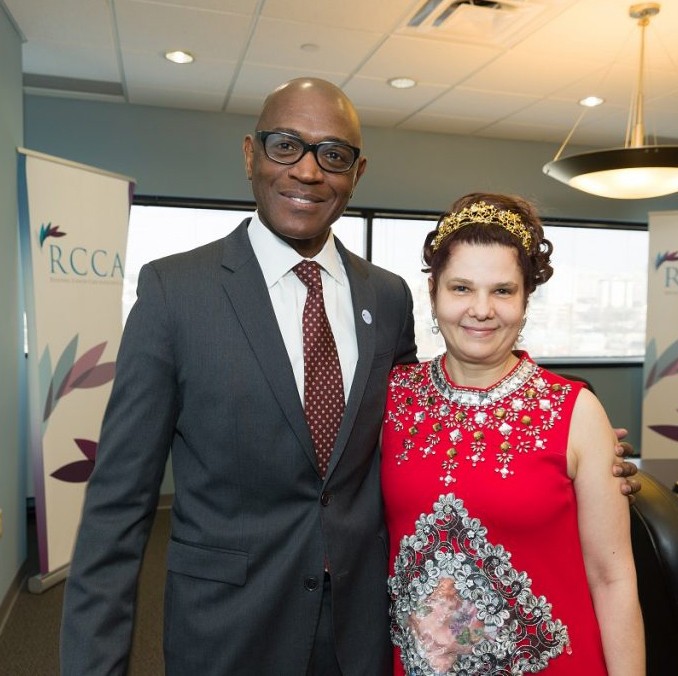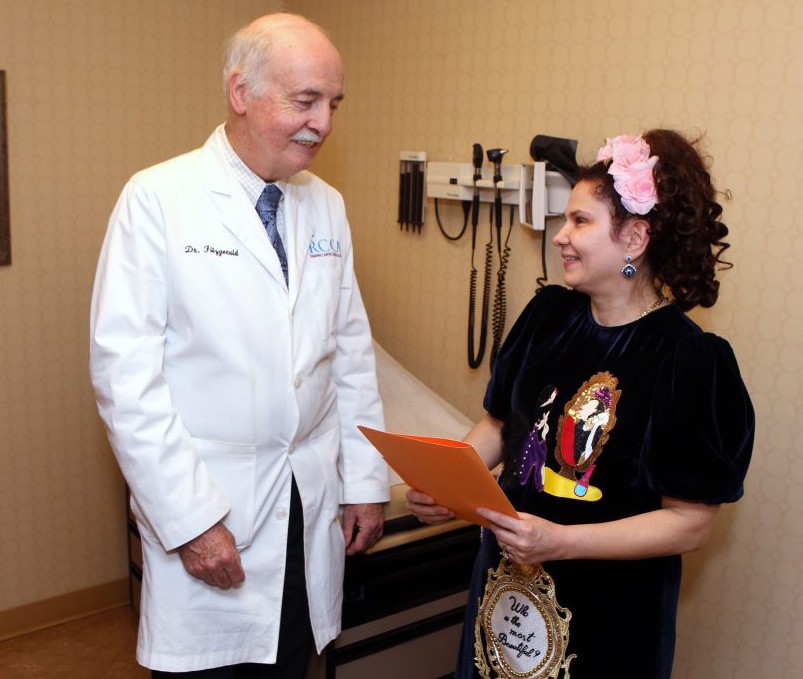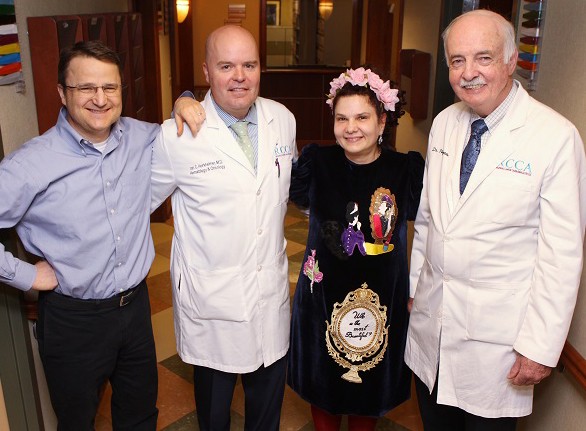
Cancer Clinical Trials: 2 RCCA Oncologists Separate Fact from Fiction
Iron deficiency and the anemia that can result from it are serious conditions Learn more from Regional Cancer Care Associates
HIPAA Alert: Potential Data Breach Learn More
Questions on Oncology, Hematology and/or Infusion Clinical Services due to COVID-19 Crisis – CALL 833-698-1623
Important Information for Our Patients Regarding the Coronavirus.
RCCA Providing Area Cancer Patients with Access to Care During Coronavirus Outbreak
RCCA Offering Patients Virtual Visits During Coronavirus Pandemic
Many forms of cancer soon will be treated like high blood pressure – as a serious disease that, even if it cannot be cured, can be managed for a very long time with oral medications that have few side effects, says Iuliana Shapira, MD.
As the newly appointed Chief Medical Officer of Regional Cancer Care Associates, LLC (RCCA), one of the nation’s largest networks of oncology specialists, Dr. Shapira is working to speed such advances, so that patients can realize the full benefits of scientists’ expanded understanding of cancer, of innovative therapies to treat cancer, and of the way cancer care is delivered.
“The main message I have for people dealing with cancer, and for their families, is one of hope,” Dr. Shapira said in a recent interview. “We are learning very fast how cancer starts, works, and travels. New therapies are invented every day. Patients should be optimistic.” The board-certified hematologist oncologist speaks as someone who has helped drive progress in cancer care. Dr. Shapira has conducted basic-science research in the role that ribonucleic acid (RNA) plays in the development of malignancies, and has done extensive clinical research in breast cancer, ovarian and gastrointestinal malignancies, and drug development. She served for several years as Associate Professor of Medicine at the Hofstra North Shore-LIJ School of Medicine, and was Director of its Center for Cancer Genetics and Cancer Control from 2008 to 2014. She joins RCCA from SUNY Downstate Medical Center in Brooklyn, where she served as Division Chief for Hematology and Oncology.
The cancer specialist explains that she was drawn to the Chief Medical Officer’s role at RCCA – which has 30 care delivery sites in New Jersey, Connecticut, and the Maryland/Washington, DC area – because of the organization’s track record of bringing cutting-edge therapies and clinical trials to community-based practices, where most cancer care in the United States is delivered.
“RCCA combines academic centers with community practices to pursue a very clear mission: Create an up-to-date, safe, and efficient office practice to deliver patient-centered cancer care,” Dr. Shapira says. She adds, “At RCCA, we place the patient at the center of our activities, and we are committed to wrapping services around the patients and offering them the best care in an appropriate and coordinated manner. We offer patient navigation, financial navigation, financial assistance with copays, and health coaching, as well as care coordination. Meanwhile, RCCA doctors are part of the community fiber. They care for people they see in the grocery store, worship with, and whose children attend the same schools as their children. Our doctors own their patients’ problems. In addition, our academic medical center affiliate, the John Theurer Cancer Center of Hackensack University Medical Center, is an incubator of innovation. The breakthroughs discovered in academia are thus rapidly disseminated into all our practices.”
Terrill Jordan, the President and Chief Executive Officer of RCCA, says that Dr. Shapira’s experience and abilities will enable her to make crucial contributions to the oncology-specialist network. “We are fortunate to have a clinical leader who fully understands the challenges and opportunities our physicians and other healthcare professionals face in this rapidly evolving environment. Dr. Shapira brings not only the clinical expertise and health-system acumen needed to lead us forward, but also the spirit and passion that will help us execute our strategy in a very effective fashion.”

Dr. Shapira says that as Chief Medical Officer, she will work with RCCA’s more than 120 physicians to pursue four goals:
1. Guarantee patient access in various community settings;
2. Chart an optimal roadmap of care;
3. Foster an understanding of the whole cancer journey and its distinct components; and,
4. Promote the best quality cancer care and patient experiences while lowering the cost of care for patients.
A major focus, she explains, will be to expand patient access to the many clinical trials offered at RCCA care sites. “I also will be working with our physicians on the dissemination and implementation of tools and interventions that rapidly translate cutting-edge therapies into daily practice, so that we can best deliver the latest gains in cancer knowledge to vulnerable or difficult-to-reach populations, and can effectively monitor the quality of intervention delivery. Our aim is to bridge the gap between clinical research and everyday practice by building a knowledge base about how health information, new technologies and interventions, and new clinical practices and guidelines are translated into community-based healthcare,” Dr. Shapira notes.

Rapidly integrating diagnostic and treatment advances into community-based cancer care is critical given the move toward use of highly individualized therapies that often target specific genetic mutations, Dr. Shapira explains.
“Cancer is a disease of genes, and as we learn more about genetic changes in cancer that drive the ability of cells to multiply continuously, invade and spread, more treatments are coming to the market,” she notes. “These treatments apply to specific patients with the mutation regardless of their cancer. For example, one specific mutation found in many cancers is V600E, found in a gene called BRAF. Any patient with this mutation, regardless of the specific cancer — melanoma, lung or colon cancer, or a form of leukemia — is able to respond to the same set of pills. We are rapidly moving away from organ-specific cancer treatment toward mutation-specific treatment. This is a revolution in the way we treat cancer.”
Dr. Shapira notes that RCCA is well prepared to offer its patients the benefits of this treatment revolution. “We use next-generation genomic sequencing of both the cancer and the patient’s own DNA make-up to identify the best precision medications for him or her. When applied correctly to patients’ DNA fingerprint, these new precision medications extend survival by more than three-fold compared to chemotherapy. In many cases, we are able to test for these mutations in patients’ blood, avoiding additional biopsies. We also test to see if a patient is well-suited for treatment with a variety of immune therapies, which are far more promising than older chemo treatments. We can harness patient’s immune systems with CAR-T cells, a form of cellular therapy proven to prolong life. We make every effort to identify every possible targeted therapy candidate and offer him or her the optimal treatment.”
For care to be truly “patient-centered,” however, therapeutic advances must be matched by an evolution in the way patients move through the healthcare system, Dr. Shapira says, adding that this is a major area of focus for RCCA.
The cancer specialist explains, “For patients, the journey through cancer — from screening and prevention to diagnosis and treatment and disease resolution or end of life — is complex and multileveled. At each stage in that journey, their cancer is managed by personnel working within their own fields of expertise, often in total separation from others involved in the patient’s care. RCCA was established to change this approach to cancer care. Our physicians integrated their practices with the aim of putting the patient first, and to deliver superior quality and the best value care to our patients. The RCCA model provides useful information for healthcare providers in determining how best to organize service delivery to achieve the best outcomes, and the best quality of care at the lowest cost for our patients. Our clinical integration allows our patients to be supported by nurse navigators and social workers who help break down the silos of care.” That integration of care also encompasses close collaboration and communication with patients’ primary care physicians, Ob/Gyns, urologists, and other doctors, she adds.

Dr. Shapira notes that RCCA’s commitment to providing value-based care is reflected in its participation in the Oncology Care Model created by the Centers of Medicare and Medicaid Services (CMS), the government agency that oversees the Medicare and Medicaid programs. “We voluntarily submitted to intense scrutiny to show in a fully transparent manner that we offer the best care,” she says.
The hematologist/oncologist adds, “I came from academic environment to RCCA because I was impressed with the RCCA model of care — the unflinching commitment to placing the patient on the pedestal and to serving patients with alacrity and celerity. The next model of cancer care delivery will be created by the hard-working oncologists with RCCA at the forefront of innovation. I am honored to be part of this group.”
RCCA includes more than 120 physicians supported by 800 employees at 30 care delivery sites, providing care to more than 24,500 new patients annually and over 245,000 existing patients.
For more information or to schedule an appointment,
call 844-346-7222. You can also schedule an appointment by calling the RCCA location nearest you.

Iron deficiency and the anemia that can result from it are serious conditions Learn more from Regional Cancer Care Associates

Iron deficiency and the anemia that can result from it are serious conditions Learn more from Regional Cancer Care Associates

The outlook for treating and preventing cervical cancer is brighter thanks to new treatment options. Learn more from Regional Cancer Care Associates.

Regional Cancer Care Associates is one of fewer than 200 medical practices in the country selected to participate in the Oncology Care Model (OCM); a recent Medicare initiative aimed at improving care coordination and access to and quality of care for Medicare beneficiaries undergoing chemotherapy treatment.